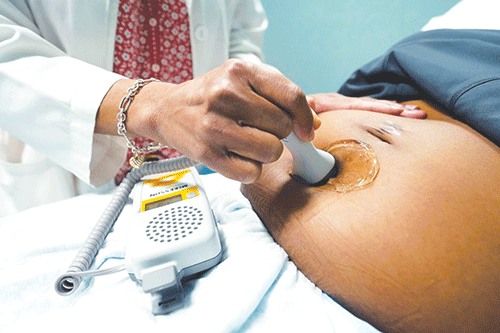London – The number of women in Britain dying during pregnancy or soon afterwards has reached its highest level in almost two decades, a new study reported yesterday.
The figures from MBRRACE-UK, which monitors maternal deaths, stillbirths and infant deaths, and their causes, showed black women and those from deprived areas remained the most severely impacted.
MPs reported last year that although the UK has one of the lowest maternal mortality ratios in the world, it has “glaring and persistent disparities in outcomes for women, depending on their ethnicity”.
It also comes after a series of scandals at maternity units within the state-funded National Health Service (NHS).
A damning 2022 report into one found failures at the Shrewsbury and Telford Hospital Trust in western England had contributed to the deaths of 201 babies and nine mothers over a 20-year period.
The latest statistics prompted renewed calls for more investment and training in maternity services, despite health bosses in England claiming that more money than ever is going into the sector.
Marian Knight, director of the National Perinatal Epidemiology Unit and MBRRACE-UK maternal reporting lead, said Britain’s maternity systems were “under pressure”, and the “increase in maternal mortality raises further concern”.
“Ensuring pre-pregnancy health… as well as critical actions to work towards more inclusive and personalised care, need to be prioritised as a matter of urgency, now more than ever,” she added.
MBRRACE-UK found there were 13.41 deaths per 100 000 pregnancies reported from 2020 to 2022.
Excluding deaths from Covid-19 — the second-most common cause — the maternal death rate for the period was 11.54 per 100 000.
This is up from 8.79 per 100 000 in 2017-2019, and the highest since 2003-2005.
The main cause of death was thrombosis and thromboembolism, or blood clots in the veins. Heart disease and deaths related to poor mental health were also common.
The maternal death rate among black women decreased slightly compared to 2019 to 2021, but this cohort remained three times more likely to die compared to white women.
Women from Asian backgrounds were twice as likely to die than white women, while women living in the most deprived areas were also twice as likely to die, compared to those in the least-deprived areas.
A spokesman for NHS England said it recognised that “further action is needed to improve the experiences of women and their families”.
He noted investment had increased to £186 million (US$237 million) annually to grow its “maternity workforce, strengthen leadership and improve culture”. – Nampa/AFP


